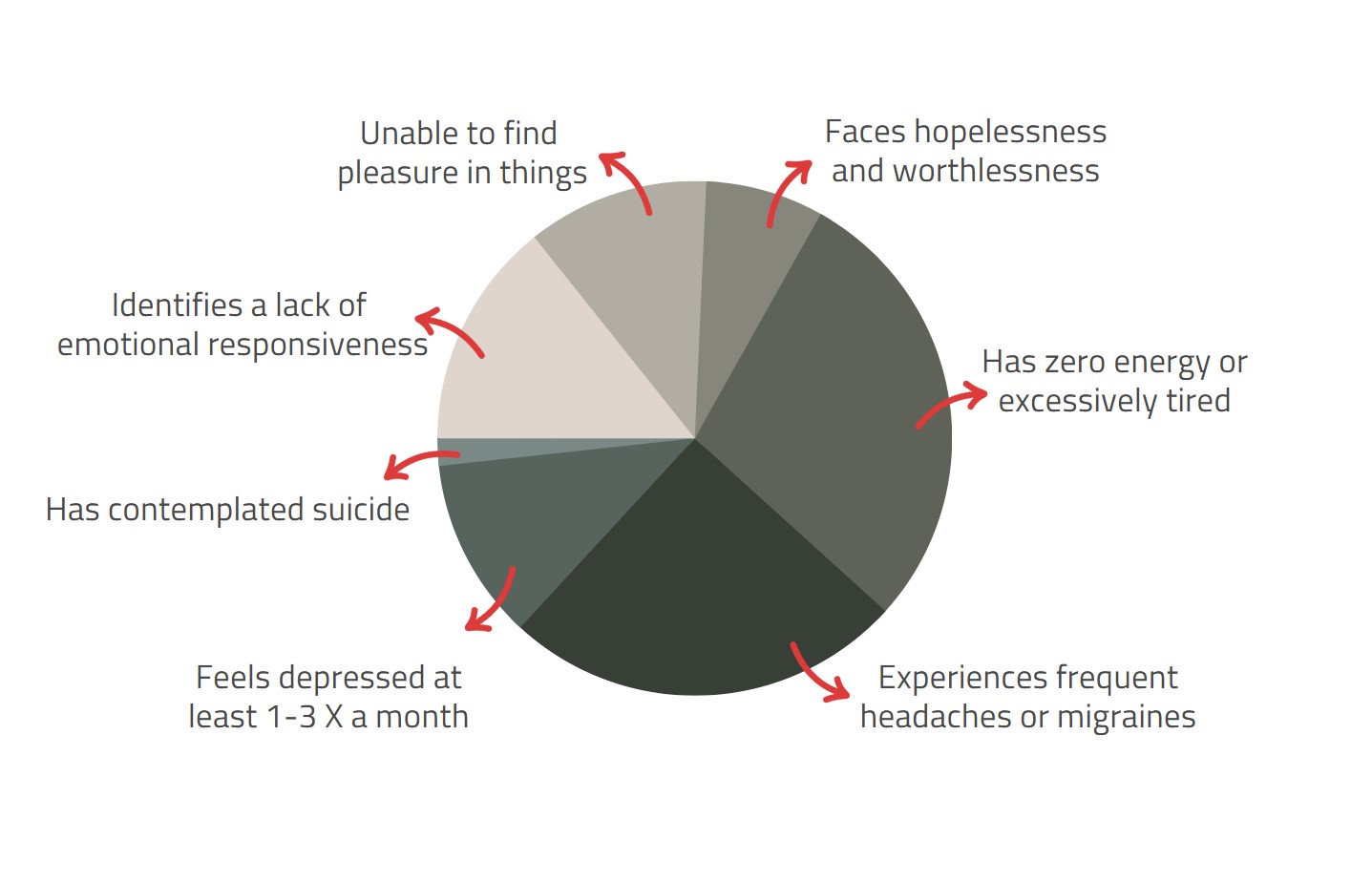Corrections Stresses & Mental Health Messes
The mental health crisis within the corrections industry is reaching unprecedented levels, and the urgency to address this issue has never been greater. Though uncomfortable and heavy, this discussion is one we can no longer afford to avoid. Mental health is a challenging topic, particularly within a field where silence is often the norm.
In the corrections industry, discussing mental health can feel like navigating a minefield of stigmas and unspoken rules. The GUARDIAN RFID team, with its collective 200 years of experience in corrections, deeply understands the overwhelming weight of these challenges. We aim to shine a light on these pressing issues, to break down the barriers of stigma, and to offer a message of solidarity: “You are not alone.”
This blog will delve into the stigmas surrounding mental health within corrections, the challenges stemming from this crisis, and ways to address it.
The Stigma Behind Mental Health
Let’s rewind a few steps to discuss why the topic of mental health is so challenging to talk about within the corrections industry. Most would point their finger at the awful unwritten rule that corrections professionals carry with them throughout their career: showing emotion = showing weakness. For corrections professionals, showing emotion can be perceived as a vulnerability, and discussing mental health requires precisely that: opening up about feelings, emotions, and vulnerabilities.
In fact, you need to be vulnerable to discuss this topic in the first place. The term "vulnerable" often carries a negative connotation, suggesting you’ve let your guard down and are defenseless. The Oxford Dictionary even defines it as "susceptible to physical or emotional attack or harm." To understand why this unspoken rule of showing emotion and being vulnerable is “bad,” we first have to acknowledge why this rule was built in the first place.
In the high-stress environment of corrections, officers are conditioned to suppress their emotions and remain unaffected by what they’re exposed to during their shifts. Day in and day out, correctional staff face stressors that over time become embedded in their minds causing them to be in constant “fight or flight” mode. From the moment they enter the facility and gear up, they are in a constant state of alertness. They have to set their mental state on autopilot to prepare for what they will face that day.

Daily Stressors
During their shifts, officers often encounter intense and distressing situations, such as fights, injuries, and even suicides. Unfortunately, for some officers, these harsh realities become a routine part of their workday. As a result, emotions that were once openly expressed become suppressed behind an ever-growing barrier. Without regular mental health check-ins and indicating when a shoulder is needed to lean on, this emotional barrier grows stronger and more resistant to collapse. When this barrier cannot be broken down, it can sometimes, tragically, lead to suicide.
A 2001 study titled Families, Officers & Corrections, conducted by John B. Rogers, PhD, shed light on the severe impact of this stress on correctional officers. Analyzing data from 3,800 officers, Rogers uncovered alarming statistics regarding their mental health. Approximately 16% reported frequent shortness of breath, and 30% experienced changes in appetite and increased nervousness. When analyzing the levels of depression and suicidal thoughts, Rogers found staggering levels:
25% of correctional officers reported feeling a lack of emotional responsiveness
20% reported an inability to find pleasure in anything
13% feel hopelessness and/or worthlessness.
50% experience having no energy or being excessively tired
44% reported frequent headaches with 12% having monthly migraines
Almost 20% reported that they felt depressed at least once to a few times a month.
3% reported thoughts of ending their lives at least once a month and an additional 6% reported such thoughts 1-2 times in the past six months
Though this data is from over two decades ago, the situation has only worsened since then. The escalating mental health crisis among correctional officers pushes the urgent need for improved support and intervention strategies.

Addressing the Crisis
Earlier this year in May, One Voice United held its first-ever Blue Ribbon Commission to address the urgent crisis of correctional staff wellness affecting the industry. The commissioners in this hearing came from all walks of life but were directly connected to the correctional industry. While some had firsthand experience working within correctional facilities, others came from varied backgrounds, including mental health, business leadership, and faith-based organizations. Despite their different backgrounds, every commissioner shared a deep-rooted passion for fixing the crisis.
During the hearing, commissioners took testimonies from each of the speakers who shared their personal experiences with the mental health challenges in corrections. It’s fair to assume that anyone who either attended or watched the recording of the Blue Ribbon Commission left feeling an overpowering sense of urgency, let alone tears in their eyes. It was reported that an average of three correctional officers die by suicide each week, further highlighting the gravity of the situation.
To better understand and address the reasons behind these tragic outcomes, law enforcement agencies across the nation need to collectively see the value of reporting cases. On June 16, 2020, President Trump signed the Law Enforcement Suicide Data Collection Act allowing law enforcement, as of January 01, 2022, to voluntarily submit data on officer deaths. This data is limited to events that occurred beforehand, the general location and demographic information, the officer's job assignment, and the method used in each law enforcement officer's suicide or attempted suicide.
As sad as it is, this Act provides facilities with a crucial tool for identifying trends and preventing future tragedies. If you’ve been in corrections for any length of time, you may recall instances where a team member faced a crisis. Did you report it? Why not? Were you hesitant because it seemed intrusive, because of concerns about the agency's response, or because of fear of repercussions for yourself or your colleague? Such concerns are understandable, but if a suicide resulted from that crisis, the regret of not reporting can be overwhelming. It’s essential to recognize that sharing this information can be a vital step in preventing further tragedies and ensuring the well-being of those in the field.
During my time as a jail administrator, one of the hardest-hitting events I had to work through was the death of one of my own. She was a bright and talented person. Those close to her were close to the agency. For months, and even today, I go back and think, “Did I miss any warning signs? Were there indicators either I or my staff should have caught?” Trying to work through this caused a crisis of my own. However, I trusted people that worked in the medical and counseling fields that I could speak with in confidence. I realize how fortunate I am to have those resources as most people do not have that advantage.
Mark CowleyJail Operations
We all know that correctional staff often hesitate to ask for help, even when they're struggling deeply. They often suffer in silence rather than reaching out in fear of being deemed unfit for their job. This ingrained fear can sometimes have tragic consequences when not dealt with. This reason alone shows beyond doubt that team members must look after and be there for one another.
If you’re wondering how to support those who may be quietly struggling, let your colleagues know you’re there for them. Even if they say they don’t need support, they’ll appreciate knowing that someone cares and is ready to listen. Your presence can make a significant difference, even if it’s just offering a sympathetic ear or a shoulder to lean on. Most of them will probably say that they don't need it, but even if they do deep down, they at least know that you are there for them if needed.
Although there isn't a “one size fits all” solution to this issue, there has been a notable increase in attention towards mental health and wellness within the correctional community. Recent studies highlight the urgent need for mental health support, and many local agencies are now bringing this crisis to light and working to positively affect change in the industry with education, intervention, support, and crisis training for staff.
We’ve all heard the phrase, “If you have a question, someone else probably has it too.” That applies here as well. If you’re struggling, one of your partners probably is as well. Be the change that can prevent another statistic and don’t be afraid to ask for help or extend a hand to someone who needs help. By reaching out and offering support, you can help prevent further tragedies and foster a more supportive environment. Your willingness to address this challenging topic shows great courage and commitment. GUARDIAN RFID is here to support you and your team, and we are dedicated to helping you get your team home safe.

